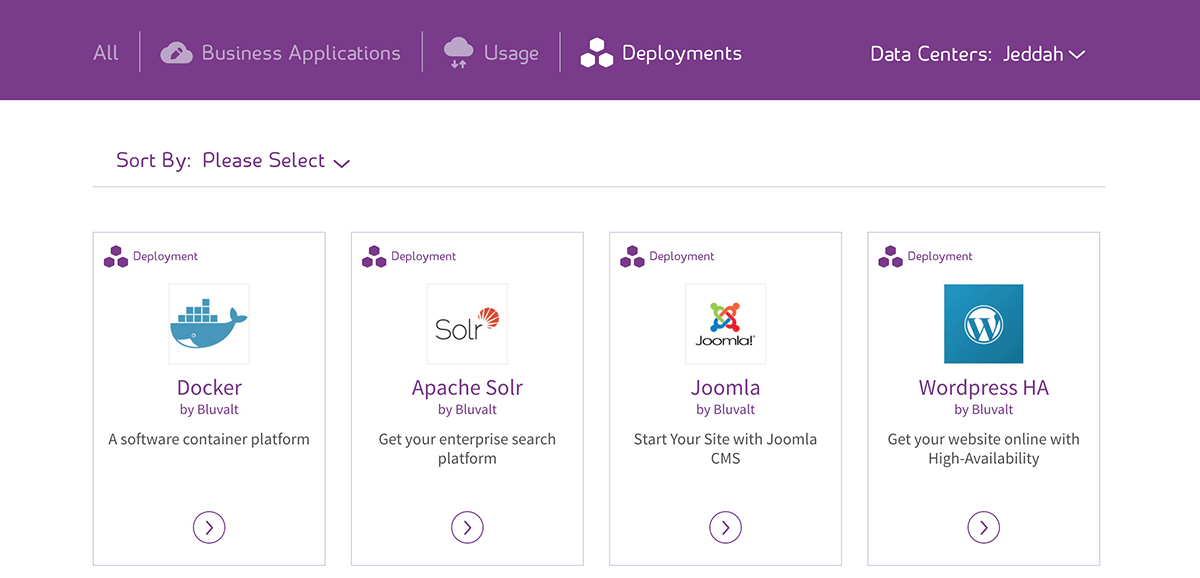“Mirantis has the most OpenStack expertise in the market and open integrations to a vast number of software and hardware vendors. This gives us the freedom to choose the servers, storage, and other components that work best for us,” says Mosaibah.
Saudi Arabia Telecom first engaged Mirantis for requirements assessment and design, and then extended the relationship to include OpenStack distribution, training and deployment services.
With Mirantis engineering support, Saudi Arabia Telecom deployed an OpenStack-based IaaS in their Jeddah and Riyadh data centers, which offered customers a broad choice of operating systems and VMs, as well as server and storage size options. Now known as Bluvalt, it is the first Saudi marketplace for cloud computing solutions, aimed at local developers and small and medium enterprises.
“Mirantis engineers are extremely talented and very responsive to our needs,” says Mosaibah. “The relationship is a true partnership where both sides are committed to each other’s success.”
Saudi Arabia Telecom’s marketplace strategy includes partner solutions such as business intelligence, email, and enterprise resource planning (ERP) applications, which differentiates its cloud offering from competitors. Already Saudi Arabia Telecom has 30 regional and international PaaS and SaaS partners and continues to add more. With this breadth, customers can find everything they need from the Saudi Arabia Telecom Cloud Marketplace.

After initially deploying the Mirantis OpenStack distribution in 2015, Saudi Arabia Telecom later migrated its cloud to Mirantis Cloud Platform (MCP) in 2017. MCP is an agile infrastructure platform based on OpenStack and Kubernetes that leverages Infrastructure as Code to allow seamless updates and in-service upgrades, enabling rapid access to the latest innovation. Saudi Arabia Telecom has deployed MCP on 100+ nodes for its Bluvalt virtual datacenter offering.
Saudi Arabia Telecom currently partners with Mirantis for 24 x 7 ProdCare Support and custom integration development services. Saudi Arabia Telecom is also currently evaluating OpenStack for their NFV cloud, which will virtualize network functions. Additionally, Saudi Arabia Telecom is working on managed private clouds and private label cloud customer offerings.
Results
Saudi Arabia Telecom’s OpenStack deployment, across three data centers, is running on hundreds of servers and will soon grow to thousands. Regional cloud demand is higher than expected and Saudi Arabia Telecom is able to comfortably meet customer needs with OpenStack based offerings. Important to this success is OpenStack’s low cost of operations, rapid community innovation, and design for quick internal adoption.
Saudi Arabia Telecom states its OpenStack cloud capital and operating expenses are 25 percent below those of proprietary alternatives and likely to exceed that benefit soon.
“With OpenStack, there’s always room for cost improvement because the community is evolving and delivering better performance and management tools,” says Mosaibah.
“The more we scale, the deeper we can draw on and contribute to the community to optimize our operational costs. With proprietary vendors, there is less room for cost improvement.”
A second OpenStack advantage is fast community innovation and code transparency. With proprietary cloud solutions, the ability to influence the direction and pace of advancements is less certain.
“Because of the rate of innovation, OpenStack is like a fast moving train that is consistently getting more powerful. We’re already receiving great benefits from the OpenStack community and look forward to contributing as much as we now receive,” says Mosaibah.
Working with Mirantis has further increased access to innovation. “Mirantis is a great partner within the community as it is well positioned to see all community contributions and identify the ones to best meet our needs,” says Mosaibah. “Mirantis is driving features into the community that are important to Saudi Arabia Telecom.”




